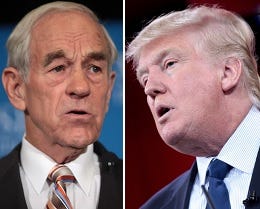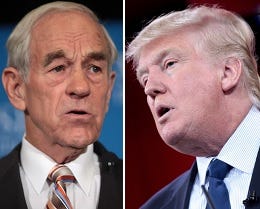
Following last Monday's presidential debate between Hillary Clinton and Donald Trump, the consensus among those in the news media was that Clinton had won it. While few commentators believed it to be a resounding victory, they gave her the edge on points, and cited Trump's unpreparedness and defensiveness as his major weaknesses.
I agree with that analysis.
Unsurprisingly, Trump and many of his supporters drew the opposite conclusion, and as proof of their side's victory, they began citing an array of Internet polls (including the Drudge Report, Time, and CNBC) whose results revealed Trump to be the clear victor. In fact, Trump himself has posted 11 separate tweets over the past three days, reiterating his dominance in post-debate online polling. Several people in the pro-Trump wing of the conservative media have also echoed the narrative, including some hosts on Fox News.
Now, it shouldn't be all that surprising that Trump would tout a media theme, or a report of public sentiment, that works in his favor. He's been doing it reflexively for well over a year, often with little regard to (or apparent interest in) the credibility of those sources. That instinct has famously led him to cite National Enquirer stories without embarrassment, and unknowingly retweet the words of white supremacists.
When it comes specifically to online polls, Trump has certainly found his wheelhouse. He wins pretty much all of them, and usually by a wide margin. We saw this on display throughout the primary season, when putting in even lackluster debate performances would earn him easy wins on the Internet. Some online polls even showed Trump winning (or placing second) in the Iowa debate — the one he didn't participate in. Now that's impressive!
Of course, there's a reason for this — as there was for Ron Paul when he won all of those same polls back in 2012 and 2008, as a presidential candidate. That reason is not that Trump and Paul are two of the greatest, most compelling orators to ever grace a debate stage. I don't think anyone believes that.
The real explanation is fairly simple: Internet polls are utterly meaningless.
Media organizations conduct these highly unscientific polls for one primary purpose: to drive traffic to their websites. The polls are not a useful gauge of anything other than how inclined a particular candidate's most loyal fans are to seek out and participate in the them.
Ron Paul had a small but enthusiastic following that was desperate for their candidate to be taken seriously, and look good on the national stage. Trump has a much larger following, but the passion and motivations are the same.
While the overwhelming majority of people who watch a presidential debate go to bed afterwards, the super-fans of candidates like Paul and Trump stay up late and scour the Internet, searching for polls to participate in (entering their choice multiple times, if possible).
There's of course nothing wrong with this. Every candidate wishes they had supporters as passionate as these people. But the results of these types of polls should not be part of any legitimate news story from a legitimate news source. Furthermore, a candidate who is touting such results should be challenged by journalists.
According to Oliver Darcy of Business Insider, this point was just made clear by Dana Blanton, the VP of public-opinion research at Fox News, to employees at the network. In a memo to Fox producers and political teams, Blanton emphasized that such polls are not credible, thus they should not be presented as valid data.
"As most of the publications themselves clearly state," Blanton wrote, "the sample obviously can't be representative of the electorate because they only reflect the views of those Internet users who have chosen to participate... Another problem — we know some campaigns/groups of supporters encourage people to vote in online polls and flood the results. These quickie click items do not meet our editorial standards."
Bravo.
A lack of journalistic discipline is one of the major proponents of bias in media organizations. In this particular case, a problem was recognized, addressed, and hopefully dealt with.
Let's see some more of this, please. And when it comes to political polling, let's be pro-science.











